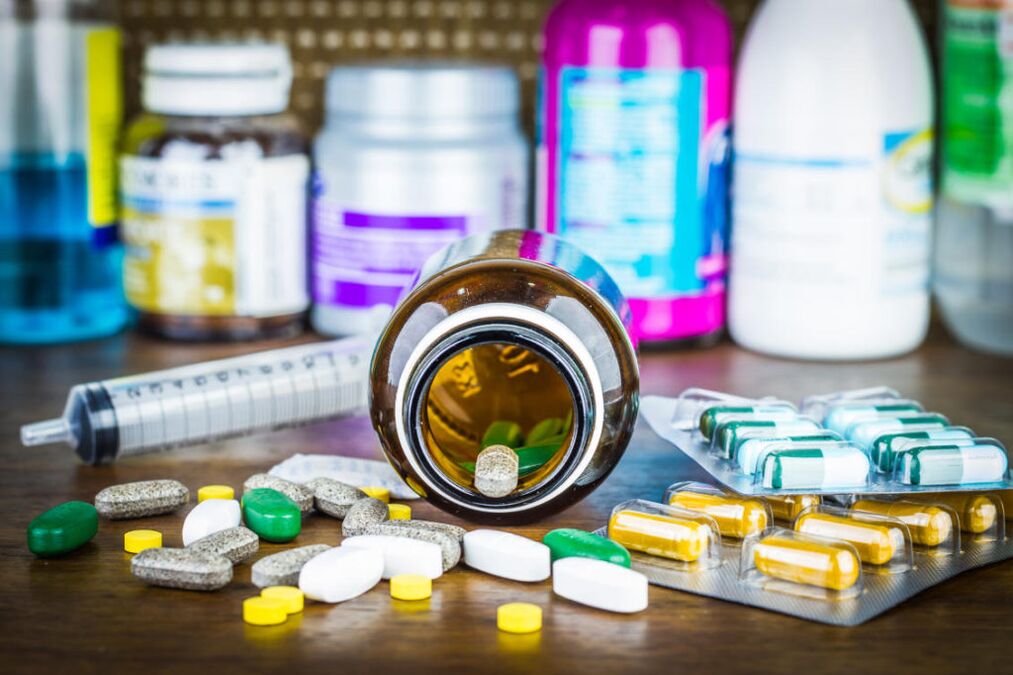In the treatment of prostatitis, drug therapy is most often prescribed. During its passage, the patient has to take various classes of drugs. Some are designed to eliminate the symptoms that are causing the discomfort, while others purposefully act directly on the affected glands, eliminating the most important thing - the underlying cause. At the same time, the intensity of the effects of the drugs varies, as some drugs are designed to eliminate the acute, while others are aimed at the chronic. Let's take a look at the most popular medications for prostatitis.

Types of drugs used to treat prostatitis
All medicines prescribed by the attending physician, according to the method of use, can be divided into several categories:
- Tablets and Capsules- Oral, moderately absorbed by the body, in the case of capsules, absorption occurs faster because all ingredients reach their destination within a short time after the gelatin shell dissolves.
- injection- These can be liquid and powder formulations, further diluted in a working solution, usually anesthesia, intramuscular or intravenous injection, and the effect becomes apparent after a few minutes.
- Rectal suppositories (candles)- It has anti-inflammatory, antibacterial and analgesic effects. It is injected into the rectum when the patient is lying on the side. It takes about half an hour in this position for the drug to be completely dissolved and absorbed.
- drip- A group of drugs that have the greatest positive effect only if directly into the affected area of the prostate, this method is used in hospitals, since it is introduced through the urethra.
- Micro irrigation- Usually, this includes non-drug medications, such as herbal decoctions, which are not a substitute for medication but can be a good way to eliminate or prevent pain.
It is worth noting that some types of drugs can be sold in more than one form at the same time, such as tablets and suppositories, so the attending physician must point out this feature.

The most popular drug for prostatitis
Treating prostatitis with medication is a rather complicated process that requires the doctor to choose the right medication that not only relieves pain and eliminates other presenting symptoms, but also helps to eliminate the root cause of the disease. The disease itself can also have different origins, manifest in acute or chronic forms, cause various inconveniences to the patient, limit his performance in natural problems, and lead to complete infertility.
In the treatment of prostatitis, classic tablets, intramuscular injections and rectal suppositories can be used. The choice of drug is directly dependent on the urgency of delivering its components to the affected organ.
Do not self-medicate! The main drug should be specially prescribed by the attending physician.
additional funding
Treatment of prostatitis is not limited to one drug. Specialists can also use other types of medications from different classes.
Fluoroquinolones
Fluoroquinolones are antibacterial drugs used to treat tuberculous prostatitis. The funds go to the complex, which can prescribe a course of four or more drugs to patients at a time.
cephalosporins
Cephalosporins are antibacterial agents designed to fight specific types of bacteria.
The range of action of such drugs is broad and directional, and the need to use a particular drug depends directly on the form of the disease and its cause.
Macrolides
Macrolides are rarely used to treat prostatitis because they are designed to fight certain types of bacteria, such as mycoplasma and chlamydia. By the way, diseases such as chlamydia are often accompanied by prostatitis, so doctors will conduct multiple tests at the same time to detect prostate problems at an early stage.
In acute manifestations of prostatitis, the attending physician may prescribe several different classes of drugs at the same time. This approach allows you to effectively deal with the symptoms and the disease itself.
pain reliever
The vast majority of analgesics are prescribed in the context of acute pain syndrome, a component of the chronic but more common acute prostatitis. The use of drugs belonging to this group outside the framework of drug therapy aimed at eliminating the disease is strictly not recommended, since the body quickly adapts to them, and in order to achieve analgesic effect, it is necessary to increase the dose, which can adversely affect the liver and kidneys. The course of analgesics is prescribed on an individual basis.
Alpha blockers and muscle relaxants
The main task of these drug groups is to relieve tension in the spastic muscles of the bladder and urethra, while reducing pressure in the pelvic area. These remedies help to get rid of discomfort and normalize the urination process.
immunomodulator
This drug basically contains natural ingredients, in the case of prostatitis - based on extracts of bovine prostate tissue. Regardless of the drug, they all share a common principle of action that allows:
- slows down the progression of the inflammatory process;
- Increases the tension of smooth muscle and bladder wall;
- Minimize the possibility of blood clots;
- Improves blood circulation in the prostate area;
- Reduce the size of the prostate.
Immunomodulators can be used for a variety of diseases, including chronic prostatitis, acute non-infectious prostatitis, prostate adenoma.
In addition, these funds are actively used for preventive purposes, which helps to avoid the onset or recurrence of the disease.
Vitamins and Biological Supplements
Methods that fall into these categories can reduce inflammation, improve fluid outflow, and relieve congestion. The need for such drugs is also due to insufficient intake of beneficial nutrients in the body, especially during antibiotic treatment.
Prostatitis is a rather complex disease, the treatment of which can only be handled by true specialists. Self-selecting drugs is strictly not recommended, as this method is likely to have complications such as infertility, impotence, and even increase the risk of cancer. Using prostatitis medications without consulting a doctor may make it impossible to cure the disease without surgery. Furthermore, self-treatment is complicated by the inability to make an accurate diagnosis, which requires appropriate equipment and knowledge.
It's also important to remember that most of the drugs used to treat prostatitis are very toxic, and some are simply incompatible. If you experience pain in the pelvic area when urinating, defecating or ejaculating, go to the toilet frequently and cannot empty your bladder properly, it's not worth the risk - consult your doctor. Thus, you can prevent not only the unfavorable course of the disease, but also the development of its chronic form, which you will have to live with for the rest of your life. Also, your sexual function will not be compromised, and with prompt treatment, you will be able to have completely normal and healthy offspring.





























